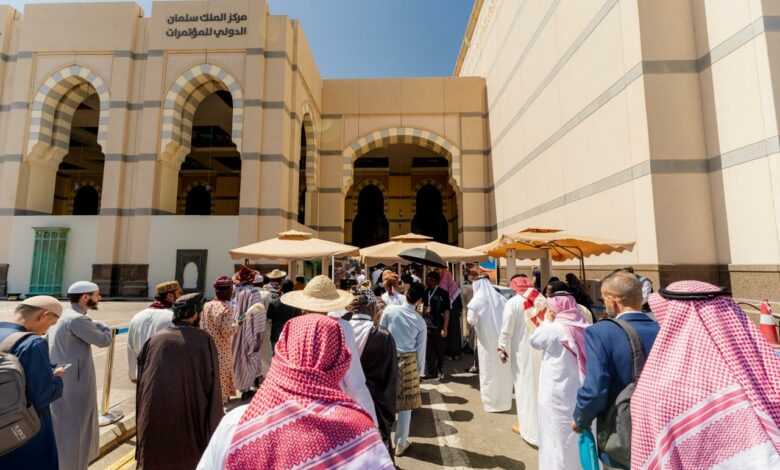The Umrah and Zirayah Forum 2025 Examines How Higher Connectivity, Big Data, and AI Can Improve Experiences
Industry Experts discuss how technology has created greater collaboration, connectivity and sharing across the Umrah and Zirayah Services Sector

Madinah – Asdaf News:
Day two of the second Umrah and Ziyarah Forum provided valuable insights into how multiple stakeholders can collaborate to enhance the spiritual journey for millions of people worldwide through the optimisation of digital transformation, air connectivity, adapting to hospitality preferences, and more.
The Forum, which runs until April 16 at the King Salman International Convention Centre in Madinah, Saudi Arabia, brings together policymakers, service providers, business leaders and innovators spanning the Umrah services ecosystem, cementing the Kingdom’s commitment to enriching the visitor journey while driving investment and transformation in the sector.
In an enlightening discussion on the main stage, a panel of travel and technology experts explored how emerging technologies such as artificial intelligence (AI) have helped create more seamless experiences and will continue to do so, while giving providers the right information to continue enhancing their offerings.
“There is a big opportunity now for customers to use AI to get the right answers, so it important for operators in our industry to support the customer in using these technologies to help them find the right answers to create those experiences,” said Fabio Cannavale, Founder and President of travel website lastminute.com, adding that his best travel companion is ChatGPT.
The panelists agreed that Vision 2030 initiatives facilitated the ease of travel into the Kingdom and a more seamless Umrah experience, and the use of AI and big data had complimented those initiatives to allow for even greater experiences for Umrah and Ziyarah visitors.
Muzzamil Alhussain, CEO of Almosafer, added: “If you look at a few years ago, you had to go and get your paper visa, you couldn’t leave certain areas, now that whole process – pre-travel – has been digitised for more than 50 countries. Booking hotels is much easier, and once those bookings have been made, all the platforms get that data. That data can then be used to create better packages, better pricing, better experiences.”
AI and the power of data have created a platform of connectivity across the ecosystem. The whole experience is now a more seamless experience.
Fouad Talat, Regional Manager of Booking.com, said that while AI has been around for a long time, the introduction of Generative AI had added “relevance” to the process and made the experiences “more personalised.”
The next stage of a truly enhanced travelling experience, said Jamel Chandoul Senior VP – MEA, Türkiye, Central Asia, & EMEA, Amadeus, is digitising a person’s ID, so that every step, from checking in for a flight, passing immigration, airport departure procedures and check-in at destination is done, through facial recognition, biometrics and AI.
Firas AlMohasen, from Maysara, added that payment technologies, such as e-wallets and digital banking apps, have also enhanced the experience for people performing Umrah from countries that don’t have traditional credit and debit card payment facilities.
Public-Private Partnerships Paving the Way for Advanced Growth and Experiences
In the final session of the day, a group of tourism and hospitality leaders shared knowledge and insights in a panel discussion titled ‘Public & Private Partnerships – Expanding Infrastructure & Hospitality for Pilgrims.’
During the discussion, Khaled Almasari, General Manager of Classification, Ministry of Tourism, Saudi Arabia, emphasized the importance of standardized hospitality benchmarks across hotels in Makkah and Madinah, noting that partnerships with the private sector are critical to achieving the ministry’s vision for religious tourism under Vision 2030.
Moustafa Manoon, VP Operations at Accor, discussed capacity building and how Accor is enhancing its Umrah services support, including the upskilling of local talent and expanding midscale hotel offerings closer to the holy sites.
Public-private investment models are key to supporting sector growth, agreed the panelists, with Sohail Alali, Director of Investment, Rua Al Madinah Holding, highlighting ongoing mega projects in Madinah aimed at reshaping the experience with increased walkability and accessibility, while Saadat Khan, Founder, Moduliv, introduced prefabricated, modular hotel units as scalable solutions to meet seasonal requirements, proposing short-term build cycles with long-term operational benefits.
Maher Abou Nasr, VP Operations, KSA, IHG Hotels & Resorts) shared the brands experience as a long-term hospitality partner in the region, stressing “scalability, quality control, and training are key pillars to elevating satisfaction.”
Aviation Sector Collaboration and Increased Connectivity Will Enhance Umrah Experience
The Aviation sector has a key role to play in enhancing the Umrah and Ziyarah experience, according to industry experts at the Umrah and Ziyarah Forum, with the capability to connect even more Muslims around the world with the Kingdom of Saudi Arabia.
Taking part in a panel discussion on day two of the forum at the King Salman international Convention Centre, in Madinah, Majid Khan, CEO of the Air Connectivity Program (ACP) and Abdullah Aleidi, VP of Global Sales at Flynas, discussed how the aviation sector is crucial to allowing more people to experience Umrah services.
With the ACP mandated to enhance connectivity between the Kingdom and local and international carriers and destinations, Khan told delegates that Europe offers “so much potential as it is a high volume territory”. He said increased connectivity with countries such as the UK, Spain and Germany would now make it even easier for people to complete their spiritual journey.
He said that increased connectivity would enhance opportunities for people to experience all that Saudi Arabia has to offer after completing their Umrah experience, with a choice of “28 airports to visit.”
Meanwhile, Aleidi said Flynas’ shift in strategy had enabled the airline to support an un-serviced Umrah market in the CIS countries, including key destinations such as Almaty, Tashkent, Bishkek.
“Ïf we take Uzbekistan, the number of people coming from Uzbekistan in 2019 was around 40,000. In 2024, it was 216,000. The opening of the direct service has really helped,” he said, adding the airline had also opened a Madinah base to further support Umrah programmes.
The aviation experts agreed that the role of the aviation sector can collaborate to create opportunities and reduce barriers to a more seamless Umrah experience.
The event is also expected to attract more than 25,000 visitors, including business leaders, investors, Umrah travel experts and professionals, decision makers, diplomatic representatives, non-profit organisations, media, entrepreneurs and innovators, and Umrah sector operators.




